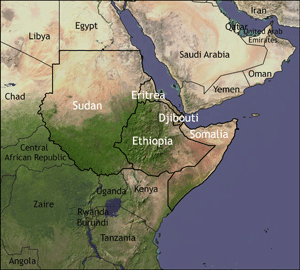The Horn of Africa takes its name from the horn-shaped land formation that forms the easternmost point of the African continent, projecting into the Indian Ocean south of the Arabian Peninsula. The term is also used to refer to the greater region of adjacent countries located at the southern end of the Red Sea and on the Gulf of Aden: the Sudan, Eritrea, Djibouti, Somalia and the landlocked Ethiopia. Despite highly diverse social, cultural, economic, and ecological characteristics, the countries of the Horn are closely related - not only by their geography, by also by their history and demography.

Located on the main shipping route for the transport of oil from the Persian Gulf to Europe and the United States, the Horn of Africa is considered one of the most strategically important regions in the world. In addition, distributed throughout the region are rich deposits of untapped natural resources, including petroleum, gold, salt, hydropower and natural gas. During the Cold War and in the years since, the region and its resources have been the object of intense interest and rivalry among the world’s major powers.
Although the Horn of Africa is richly endowed with rivers, lakes, forests, livestock and high agricultural potential, it remains one of the poorest and most conflict-ridden corners of globe. Extended periods of drought, major floods, and internal conflicts fuelled by external interference have led to widespread devastation through war and famine. Recent research indicates that the countries of the Horn of Africa are also likely to be among the most severely affected by current processes of climatic change.
In recent decades, armed conflict and natural disaster have led to the massive displacement of various population groups both within and between the countries of the Horn. This has only served to compound the problems of ethnic divisions that arose through the arbitrary creation of national boundaries by the former colonial powers of the region.
In order to coordinate their efforts in dealing with the common challenges they face, the countries of the Greater Horn of Africa (including the East African countries of Kenya and Uganda) have joined together in the
Intergovernmental Authority on Development (IGAD), with headquarters in Djibouti.
NCCR North-South activities in the Horn of Africa are overseen by the Regional Coordination Office in Addis Abeba, Ethiopia. Research emphases include health and human security, the role of institutions (public and private) in mediating conflicts and regulating access to resources and livelihood means, and identifying strategies for sustainable use of natural resources in view of climate change.
Regional Coordination
Horn of Africa Regional Office
Berhanu Debele (Regional Coordinator)
P.O. Box 8707
Addis Abeba, Ethiopia
Phone: ++251 (0) 11 661 22 55 or ++251 (0) 11 661 22 36
Fax: ++251 (0) 11 661 22 29
E-mail:
nccrhorn@ethionet.et
Related content
Publications